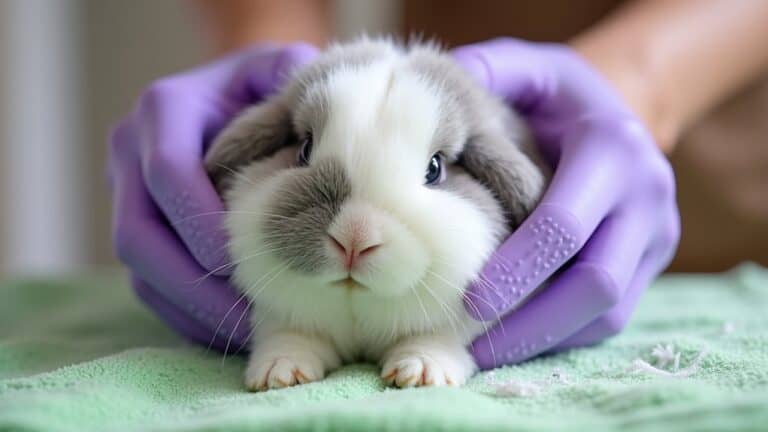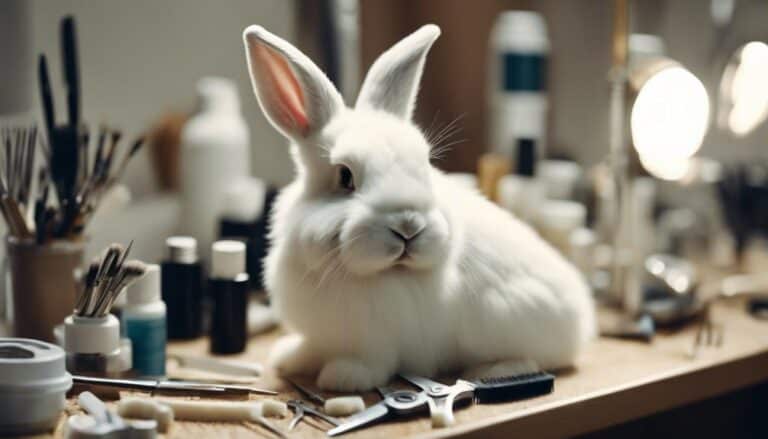If you've ever wondered about the subtle cues your bunny gives, you might be surprised at how vital it is to pay attention.
Ignoring bunny body language could lead to serious consequences, and the signs they display are not to be taken lightly.
Understanding these signals could mean the difference between life and death for your beloved pet.
Contents
Key Takeaways
- Understanding rabbit body language is crucial for detecting signs of distress or pain.
- Recognizing behavioral changes can prevent fatal outcomes.
- Responding promptly to signs of unhappiness or loneliness is essential for rabbit well-being.
- Providing a stimulating environment and social interaction is key to keeping rabbits happy and healthy.
Signs of an Unhappy Rabbit
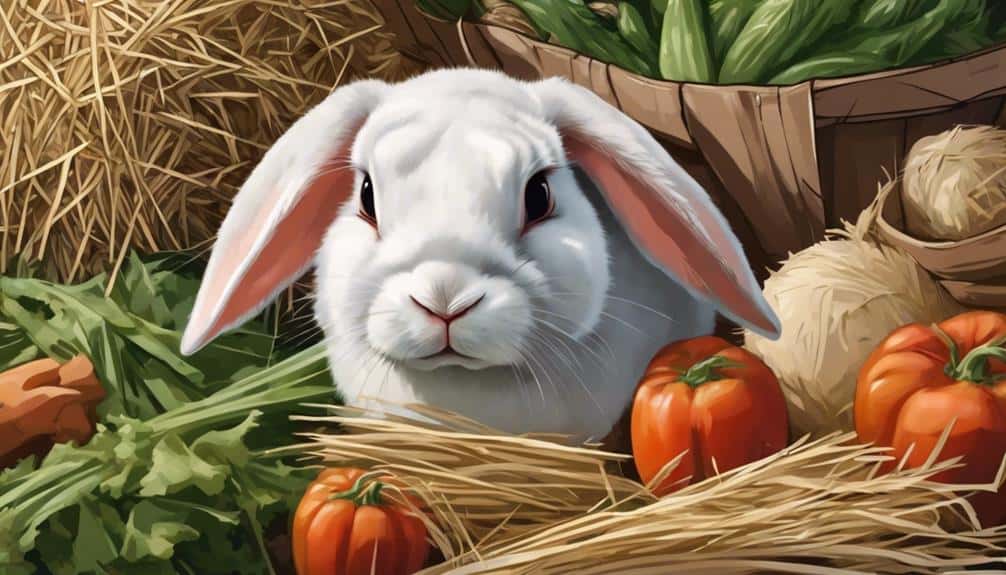
If your rabbit is feeling unhappy, their body language will provide clear indicators of their distress. Pay attention to their ears; if they're flattened against the back, it could mean your rabbit is worried or unhappy. Additionally, if your rabbit exhibits quiet behavior, abnormal sitting positions, or thumps their hind legs, these are all signs of an unhappy bunny.
Watch out for excessive jumping, heightened watchfulness, or increased aggression as these could all signal stress in your rabbit. Also, if your rabbit shows disinterest in food or grooming, along with a hunched posture, it may indicate unhappiness. A tucked-up posture with the chin tucked in and a nose that isn't twitching could be a sign of depression or stress in your scared rabbit.
Recognizing a Depressed Rabbit
If you notice your rabbit with flattened ears, a hunched posture, or disinterest in food, they might be feeling down.
Watch out for changes like excessive jumping, aggression, or thumping hind legs, as these can be signs of stress in your bunny.
Signs of Rabbit Depression
Recognizing a depressed rabbit involves observing key behavioral signs such as flattened ears, a tucked-up posture, and quiet behavior. Lonely pet rabbits may show signs like overeating, fur pulling, or hyperactive and angry tendencies. If your rabbit is feeling lonely, it might bite, nudge, or dig on you for attention.
They could also exhibit destructive behavior, excessive vocalization, or seek more human interaction. Pay attention to any changes in their usual behavior to catch signs of depression early. By recognizing these subtle cues, you can provide the support and care needed to help your rabbit feel happier and more secure in their environment. Your attentiveness can make a significant difference in your rabbit's well-being.
Behavioral Changes to Watch
Observing your rabbit's body language closely can provide valuable insights into their emotional well-being, particularly when it comes to recognizing signs of depression or stress. Rabbits show flattened ears against the back, a tucked-up posture with chin tucked in, quiet behavior, abnormal sitting positions, and thumping hind legs when unhappy.
Notice your rabbit for excessive jumping, aggression, disinterest in food, and a hunched posture as these may also indicate unhappiness. Lonely rabbits may exhibit behaviors such as overeating, fur pulling, biting, and seeking attention through biting or digging. Signs of frustration, destructive behavior, and increased dependence on human interaction can signal loneliness in rabbits.
Seeking Veterinary Advice
When noticing signs of depression in your rabbit, it's important to seek veterinary advice promptly to guarantee proper diagnosis and treatment. If your rabbit is displaying decreased activity, reduced appetite, or a lack of interest in grooming, these could be indications of depression.
A vet will conduct a thorough examination, looking for signs such as weight loss, overgrooming, or increased aggression. They may recommend environmental enrichment, social interaction, and dietary adjustments to help your rabbit.
Ensuring your rabbit has access to food and water is vital for their well-being. Remember, addressing your rabbit's mental health is as important as their physical health. Contacting a vet right away will provide the best chance for your rabbit to receive the care they need.
Understanding Stressed Rabbit Behavior
Understanding a rabbit's stressed behavior is essential for their well-being and your bond with them. Rabbits often communicate their stress through various signs like flattened ears, a tucked-up posture, and unusual sitting positions. When you notice your rabbit displaying behaviors such as excessive jumping, aggression, hind leg thumping, or a lack of interest in food and grooming, it's important to recognize these as signs of stress.
Additionally, abnormal actions like hunching, frequent hiding, or being overly watchful can also indicate a rabbit under stress. Addressing the reasons behind your rabbit's stress is critical for maintaining their health and happiness. Ignoring these signs could lead to serious health issues or even prove fatal for your beloved pet.
Detecting Loneliness in Your Rabbit
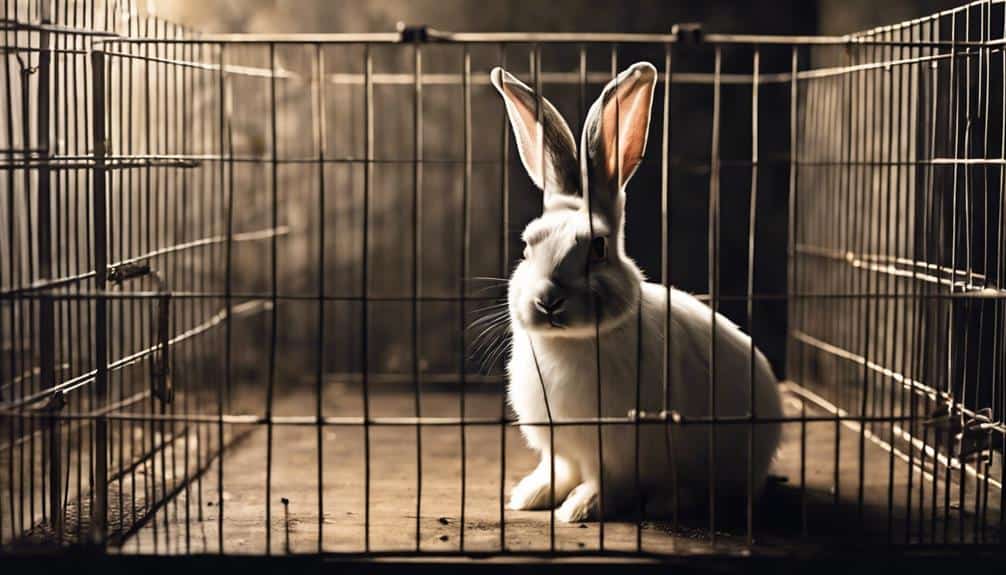
Noticing signs of loneliness in your rabbit is important for their well-being and your bond with them. Loneliness in rabbits can manifest in various ways, impacting both their physical and mental health. Signs of frustration, such as excessive vocalization, biting, or digging, can be indicative of loneliness in your furry companion.
When rabbits feel isolated or lack proper social interaction, they may resort to negative behaviors like overeating, fur pulling, or displaying aggression. Paying attention to these signals is vital as lonely rabbits may also exhibit destructive tendencies and seek constant attention from their human caregivers.
Recognizing loneliness in your rabbit early on can help prevent further negative effects on their well-being. By addressing their emotional needs and providing adequate social stimulation, you can create a supportive environment that promotes a healthier and happier life for your beloved pet. Remember, observing and understanding your rabbit's behavior is key to fostering a strong bond and ensuring their overall welfare.
Interpreting Angry Rabbit Signals
When your rabbit growls, grunts, or lunges, these are clear signs of anger or territorial aggression that you need to recognize.
Pay attention to tail thumping, rapid foot stomping, or ears pinned back tightly against the body for cues of annoyance or aggression in rabbits.
Understanding these warning signs can help you avoid escalating the situation by knowing when your rabbit is ready to attack.
Recognizing Rabbit Aggression Cues
Recognize the warning signs of rabbit aggression by understanding their body language and behavioral cues. Here are three key aggressive rabbit signals to watch out for:
- Growling, Thumping, Lunging, and Biting: These actions are clear warnings that the rabbit is feeling threatened or territorial.
- Ears Pinned Back, Raised Fur, and Tense Body Posture: When you see these signs, the rabbit is likely ready to defend itself or attack.
- Tail Flicking, Charging, and Boxing with Front Paws: These behaviors indicate potential danger or disputes over territory.
Understanding these signals is essential as aggression in rabbits can escalate rapidly, leading to harm if ignored. By respecting and responding to these cues, you can help create a safer environment for both you and your rabbit companion.
Understanding Rabbit Warning Signs
With flattened ears, narrowed eyes, and a tense body posture, an angry or aggressive rabbit may exhibit clear warning signals. When a rabbit is feeling threatened or territorial, you may notice growling, grunting, or loud thumping noises. Lunging, charging, or circling behavior are aggressive signals that indicate the rabbit isn't feeling comfortable.
Additionally, incessant pawing, scratching, or biting at objects can show frustration or aggression. Defensive body language such as avoiding eye contact, turning away, or displaying defensive postures are signs of an angry or uncomfortable rabbit. Remember, rabbits are creatures of habit, and any deviation from their usual behavior could be a warning sign.
Stay observant and respectful of their boundaries to guarantee a safe and happy environment for both you and your furry friend.
Ensuring a Happy Rabbit
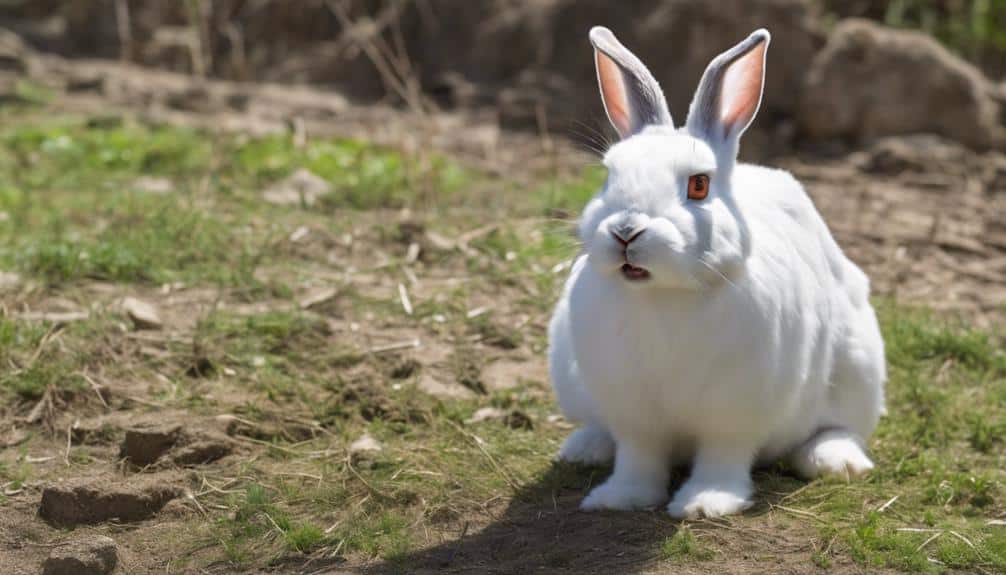
To confirm your rabbit's happiness and well-being, creating a stimulating environment and providing social interaction are essential. Here are three important steps to guarantee a happy rabbit:
- Offer a Variety of Toys and Enrichment: Give your rabbit toys like chew sticks, tunnels, and puzzle feeders to keep them mentally engaged and physically active. Rotating toys regularly can prevent boredom and promote curiosity.
- Socialize and Interact Daily: Spend quality time with your rabbit through gentle petting, play sessions, and even training exercises. Rabbits are social animals that thrive on companionship, so interacting with them regularly can boost their mood and overall happiness.
- Consider Getting a Rabbit Companion: If possible, consider getting a compatible rabbit companion for your furry friend. Having a rabbit buddy can provide constant companionship, reduce feelings of loneliness, and encourage natural social behaviors.
Decoding Rabbit Body Language
Understanding your rabbit's body language is pivotal for interpreting their emotions and guaranteeing their well-being. When a rabbit is frightened, it may exhibit flattened ears, a tucked-up posture, and quiet behavior. If you notice these signs, make sure to create a calm and safe environment for your rabbit to help alleviate their fear. Thumping hind legs can indicate unhappiness or distress, so pay attention to these cues to address any potential issues promptly.
On the other hand, happy rabbit behavior includes hopping, jumping, twisting, and engaging in playful antics like binkying. Observing these cheerful actions lets you know that your rabbit is content and enjoying their environment.
Conversely, signs of pain in rabbits, such as a hunched posture, reluctance to move, teeth grinding, and changes in behavior, require immediate attention from a veterinarian to guarantee your rabbit's well-being.
Frequently Asked Questions
What Happens if You Don't Give Your Rabbit Attention?
If you don't give your rabbit attention, they can suffer from loneliness, stress, and health issues. Socialization is important for their well-being, preventing destructive behaviors and promoting a longer, happier life. Show them love and care always.
What Is the Most Common Cause of Death in Rabbits?
Neglecting rabbit health can lead to dire consequences. One of the most common causes of death in rabbits is gastrointestinal stasis. Recognizing symptoms like reduced appetite and lethargy promptly allows for crucial veterinary intervention to save lives.
How Long Can a Bunny Go Without Attention?
You should never leave a bunny alone for long, as attention is crucial for their mental health. Lack of social interaction can impact their well-being, leading to loneliness and stress. Regular attention guarantees a happy, healthy bunny.
What Is Aggressive Body Language in Rabbits?
When understanding aggression in bunnies, pay attention to their signals: lunging, boxing, ears pinned back, and thumping. Recognize their language to avoid misunderstandings or conflicts. Stay mindful of their cues for a harmonious relationship.
Conclusion
As you observe your bunny's body language, remember that their well-being relies on your ability to understand their signals. By recognizing signs of stress, unhappiness, or loneliness, you can guarantee a happy and healthy rabbit. Pay attention to their behavior, address any concerns promptly, and provide the love and care they need.
Trust your instincts and stay attuned to your furry friend's needs – it could be a matter of life and death.



